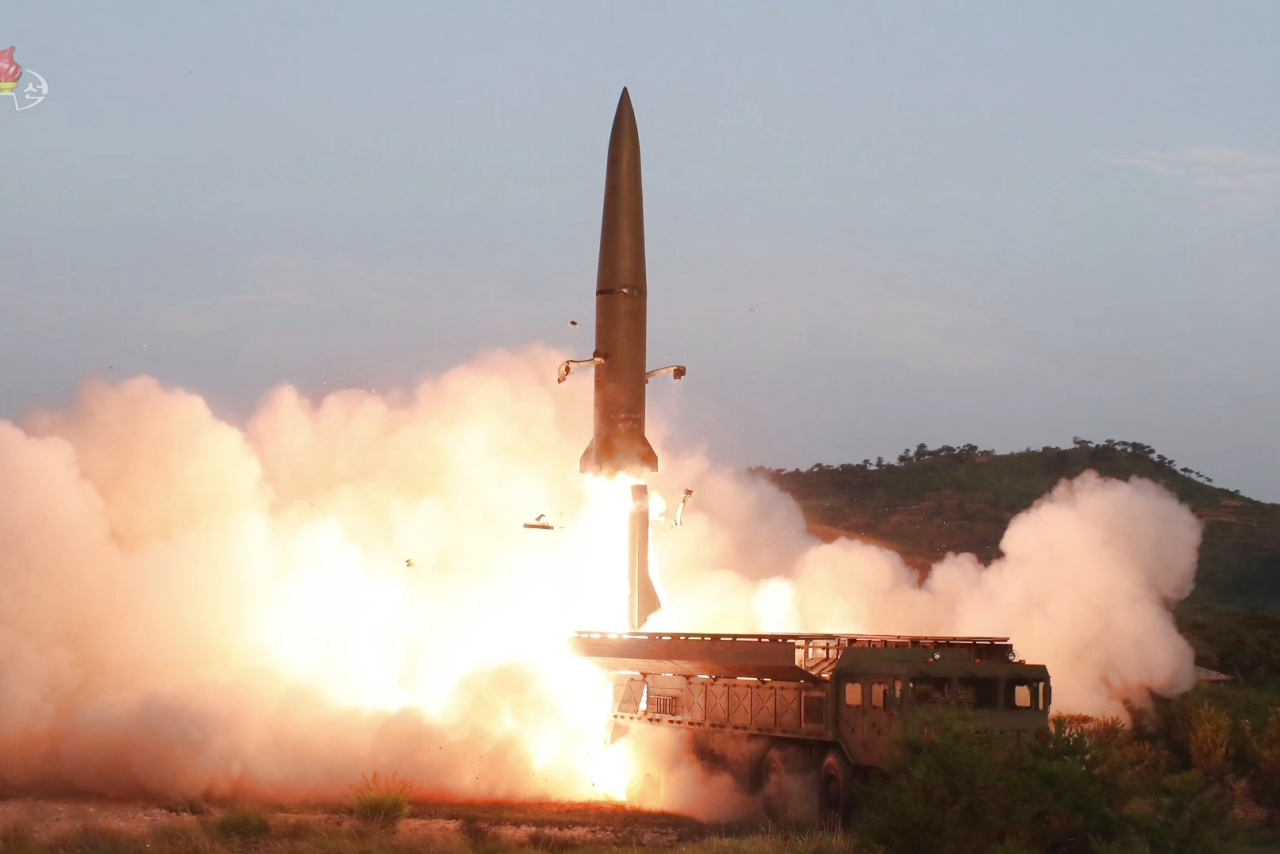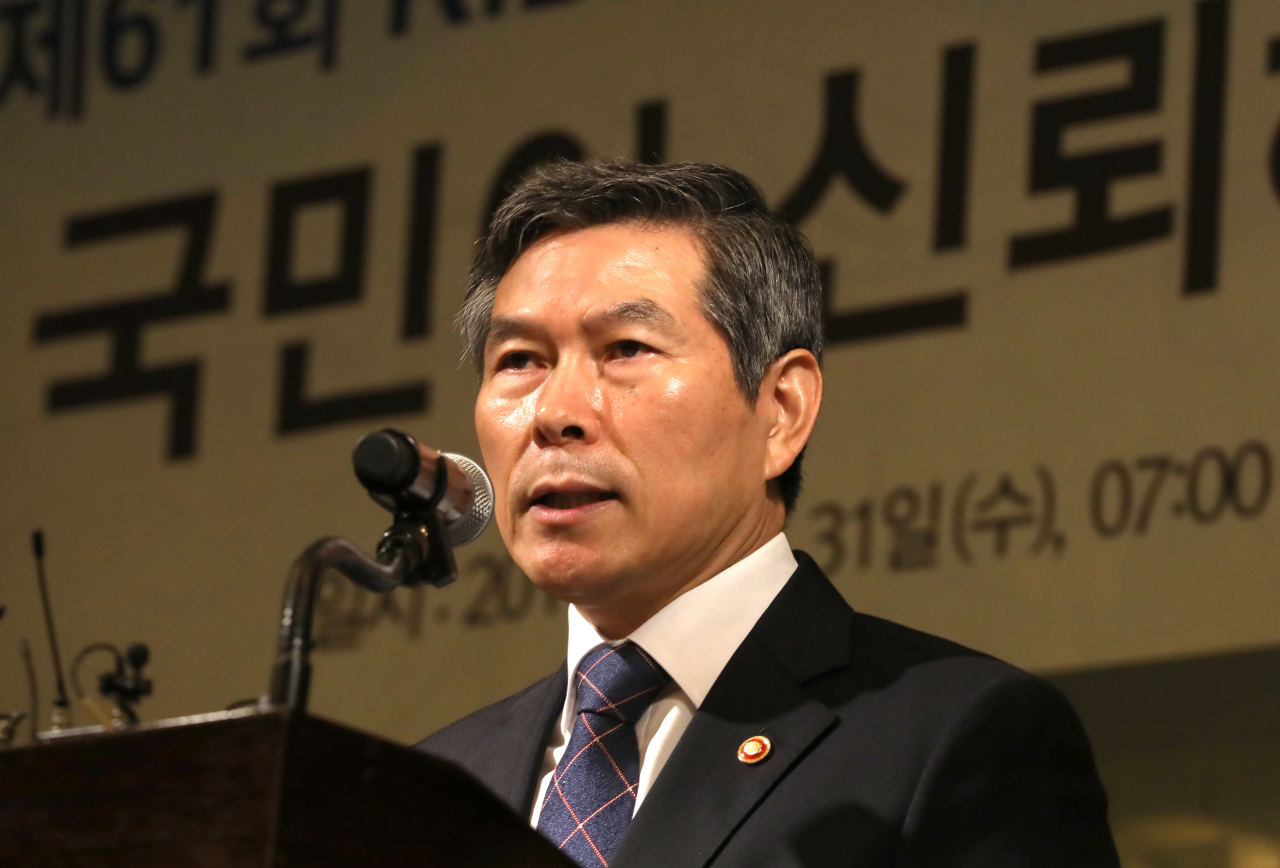Cheong Wa Dae voices deep concern over NK’s missile launch
N. Korea fires two short-range ballistic missiles: JCS
By Jo He-rimPublished : July 31, 2019 - 17:45
South Korea’s presidential office on Wednesday expressed deep concerns over North Korea’s latest missile launch, saying North Korea’s actions could damage efforts to establish peace on the Korean Peninsula.
North Korea fired two short-range ballistic missiles near the east coast city of Wonsan, six days after the last missile launch, early Wednesday morning, Seoul’s military said.
North Korea fired two short-range ballistic missiles near the east coast city of Wonsan, six days after the last missile launch, early Wednesday morning, Seoul’s military said.

In response to the missiles, the presidential office also called a National Security Council meeting, presided over by National Security Director Chung Eui-yong.
“The council members expressed strong concerns that North Korea firing two short-range ballistic missiles could have a negative influence on the efforts to establish peace on the Korean Peninsula,” Cheong Wa Dae said in a statement. “(The council) stressed that our military should closely monitor related developments and to maintain readiness.”
The NSC members also stressed that recent developments should not be allowed to effect denuclearization talks.
“Members decided to continue diplomatic efforts to prevent losing the momentum for resumption of negotiations for the denuclearization of the Korean Peninsula that was created by the historic South-North-US meeting at Panmunjom,” Cheong Wa Dae said in the statement, referring to the gathering of President Moon Jae-in, US President Donald Trump and North Korean leader Kim Jong-un at the border village on June 30.
According to the Joint Chiefs of Staff, North Korea fired two ballistic missiles from the Kalma site in Wonsan, South Hamgyong Province, northeast into the East Sea, at 5:06 a.m. and 5:27 a.m.
The missiles both traveled about 250 kilometers and reached altitudes of about 30 kilometers. They were also fired from a transporter erector launcher, the JCS explained.

Defense Minister Jeong Kyeong-doo raised a strong voice against North Korea’s missile launches, stressing that any party who threatens the security of South Korea is an “enemy.”
“It is obvious to view North Korea as an enemy if it threatens and provokes us,” Jeong said at a defense forum hosted by the Korea Institute for Defense Analyses, a couple of hours after Pyongyang fired the missiles.
In Seoul’s 2018 defense white paper published in January, the Ministry of National Defense had removed the phrase specifically describing North Korea as South Korea’s “enemy,” appearing to reflect the liberal administration’s efforts to create a mood for peace on the Korean Peninsula.
Jeong also noted that South Korea’s defensive assets can intercept oncoming North Korean missiles.
“There are concerns as the missiles fired recently appear to be similar to the (Russian) Iskander, flying low and capable of ‘pull-up’ maneuvers. But they are all within the intercept performance range of our defensive assets,” Jeong said, adding that South Korea has much more advanced military technology than the North.
The “pull-up” maneuver refers to when a missile in reentry phase pulls up to fly horizontally and then dives to attack its target with a near 90-degree falling angle to avoid detection and interception.
Jeong also pointed out that the military’s real-time surveillance platform had detected all signs of the missile launches.
“The first missile launch was detected by the Aegis Combat System and the Master Control and Reporting Center, and the second one was observed by both of them as well as by the ballistic missile early warning system,” Jeong said.
According to the JCS, intelligence authorities of Seoul and Washington, who view the launches as missile tests, are on guard against additional launches and are maintaining a defense readiness posture.
“We call on North Korea to stop firing missiles, as its past series of launches do not help ease tensions on the Korean Peninsula,” the JCS said in a statement.
North Korea appears to have pushed ahead with the missile tests for the fourth time this year, despite the rainy and cloudy conditions in the Kalma area.
Further analysis is needed to verify missile types, but they may be similar to ones fired on July 25, the JCS added.
Pyongyang launched two short-range ballistic missiles into the East Sea last week from the Hodo Peninsula, northeast of Wonsan.
At the time, the two missiles flew about 430 kilometers and 690 kilometers, each reaching altitudes of about 50 to 60 kilometers.
Cheong Wa Dae described them as “new types of short-range ballistic missiles,” which experts say are probably modified Russian Iskander missiles that North Korea has updated.
“I think North Korea may have tried to show the various ways of launching and the flying patterns of its updated version of the Iskander,” said Kim Dong-yeob, a professor at Kyungnam University’s North Korean studies school.
“It is also likely that (the North Korean leadership) intended to strengthen internal solidarity and boost its military’s morale with its summer military exercises -- justifying them by criticizing South Korea’s military buildup and joint military exercises with the United States.”
By Jo He-rim (herim@heraldcorp.com)



![[Herald Interview] 'Amid aging population, Korea to invite more young professionals from overseas'](http://res.heraldm.com/phpwas/restmb_idxmake.php?idx=644&simg=/content/image/2024/04/24/20240424050844_0.jpg&u=20240424200058)















